It’s natural to want to share your favorite human snacks with your beloved canine companion. After all, if something is safe for you to eat, it must be okay for your dog, right? Not necessarily. While many human foods are perfectly safe and even beneficial for dogs, some can be highly unhealthy and downright dangerous. Understanding the distinct differences in canine digestion is critical, as feeding the wrong foods can lead to long-term health problems, and in extreme cases, even death.
Dogs, being omnivores, don’t strictly require fruits or vegetables as a core part of their diet. Their primary nutritional needs are met by a balanced commercial dog food. However, offering dog-safe fruits and vegetables as occasional treats or snacks can provide extra vitamins, minerals, fiber, and hydration. The key is knowing which ones are safe, how to prepare them, and which ones to absolutely avoid. This comprehensive guide will help you navigate the world of human foods, focusing particularly on What Vegetables Should A Dog Not Eat, alongside other dangerous and safe options. To ensure your furry friend stays healthy and happy, it’s essential to be informed about foods to avoid feeding your canine friend.
Understanding Dog Digestion and Why Some Vegetables Are Harmful
Dogs digest food differently than humans. Their digestive systems are more sensitive to certain compounds found in plants that are harmless to us but toxic to them. These compounds can cause a range of issues, from mild gastrointestinal upset like vomiting and diarrhea, to severe conditions such as red blood cell damage, kidney failure, or even cyanide poisoning. Knowing these risks is the first step in preventing accidental poisoning and ensuring your dog’s well-being.
Vegetables Dogs MUST Avoid
When considering what vegetables should a dog not eat, there are a few absolute no-gos that every pet owner should be aware of. These vegetables contain compounds that are toxic to dogs and can cause serious health complications.
Onions, Garlic, Leeks, and Chives (Allium Family)
All members of the Allium family – including onions, garlic, leeks, and chives – are highly toxic to dogs, and cats. These vegetables contain N-propyl disulfide, a compound that damages red blood cells, leading to a condition called hemolytic anemia. This means your dog’s red blood cells can’t get enough oxygen, resulting in symptoms such as lethargy, weakness, pale gums, elevated heart rate, and even collapse.
The severity of poisoning depends on the amount consumed relative to the dog’s body weight. Even small amounts can be harmful, and poisoning can occur whether the vegetables are raw, cooked, dried, or powdered. Garlic is generally considered more toxic than onions. Poisoning from onions is particularly serious in Japanese breeds of dogs like Akitas and Shiba Inus, but all dogs are very susceptible to it. It’s important to remember that some specific breeds can have different sensitivities to certain foods.
Always secure leftovers containing these ingredients, especially in prepared human dishes like stir-fries, sauces, or soups. Educate children in the household about the dangers of sharing human food with pets, particularly if it contains allium vegetables. If you suspect your dog has ingested any amount of these, contact your veterinarian immediately.
Wild Mushrooms
While certain store-bought mushrooms (like white button or cremini) are generally considered non-toxic in small, cooked quantities, wild mushrooms are an entirely different story and pose a significant risk. Only a small percentage of the 50,000 mushroom species worldwide are known to be toxic, but the poisonous ones can cause severe illness or even be fatal to your dog. Symptoms can range from gastrointestinal distress to neurological problems, liver failure, or kidney failure, depending on the type of mushroom ingested.
Because it’s nearly impossible for an untrained eye to distinguish between safe and toxic wild mushrooms, it’s best to treat all wild mushrooms as poisonous. If you have mushrooms growing in your yard, remove them promptly. If your dog consumes any wild mushroom, consider it a veterinary emergency and seek immediate professional help. Washed mushrooms purchased from a supermarket for human consumption are generally fine for dogs in very small amounts, but offer no significant nutritional benefit.
Asparagus (Limited Benefit, Not Dangerous)
Asparagus isn’t necessarily toxic or unsafe for dogs, but there’s genuinely no significant benefit to feeding it to them. The stalks are quite tough when raw, making them difficult for dogs to chew and digest properly, potentially leading to choking hazards or gastrointestinal upset. By the time you cook asparagus down enough to make it soft and palatable for a dog, it loses much of its already modest nutritional value.
If you’re looking to share a vegetable with your dog, there are plenty of other options that offer much more nutritional punch and are easier for them to enjoy. Save the asparagus for your own plate and choose a more dog-friendly veggie instead.
Safe Vegetables Your Dog Can Enjoy in Moderation
Beyond the essential commercial dog food, certain vegetables can make excellent, healthy, and low-calorie treats for your dog. They provide vitamins, minerals, and fiber, contributing to your dog’s overall health when given appropriately.
Carrots
Carrots are an excellent low-calorie snack, packed with fiber and beta-carotene, which is converted into vitamin A in the body. The crunchy texture of raw carrots also makes them great for your dog’s teeth, helping to scrape away plaque. Carrots are a common ingredient in many commercial dog foods and treats for good reason. You can offer them raw, steamed, or cooked, cut into bite-sized pieces.
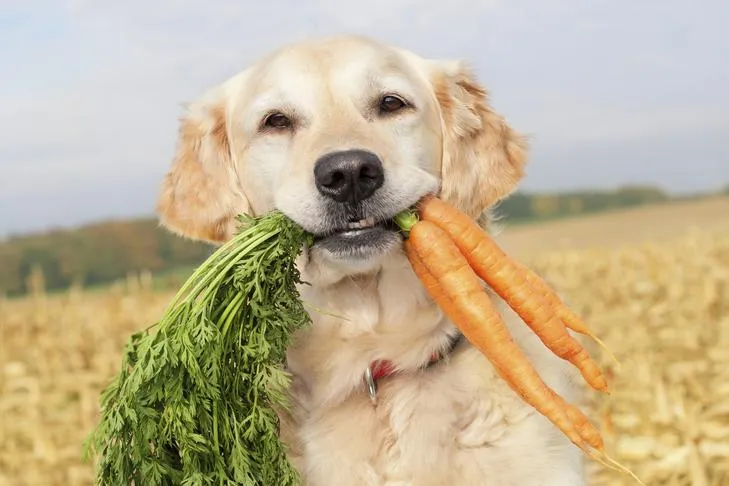 A Golden Retriever gently holding several carrots in its mouth, illustrating a safe and crunchy vegetable snack for dogs.
A Golden Retriever gently holding several carrots in its mouth, illustrating a safe and crunchy vegetable snack for dogs.
Green Beans
Chopped, steamed, raw, or canned (plain, no-salt-added) – all types of green beans are safe for dogs to eat. They are a fantastic source of essential vitamins (A, C, K), minerals (iron, magnesium), and fiber, while being very low in calories. This makes them a great treat, especially for dogs who are on a weight management plan. Opt for no-salt canned green beans or fresh/frozen ones. Frozen green beans can also be a fun, crunchy enrichment snack.
Peas
Green peas, snow peas, sugar snap peas, and garden or English peas are all generally safe for dogs. Peas are rich in vitamins (A, B, K), minerals, and provide protein and high fiber content. You can feed your dog fresh or frozen peas. As with green beans, avoid canned peas with added sodium, as excess salt is not good for your dog.
Broccoli
Broccoli can be safe for dogs in very small amounts and served as an occasional treat. It’s high in fiber and vitamin C and low in fat. However, broccoli florets contain isothiocyanates, compounds that can cause mild to potentially severe gastric irritation in some dogs. Additionally, tough broccoli stalks can be a choking hazard or cause obstruction in the esophagus. If you do offer broccoli, it’s best to give small, cooked pieces of the florets to minimize these issues.
Brussels Sprouts
Brussels sprouts are loaded with beneficial nutrients and antioxidants for both humans and dogs. They are rich in vitamins K, C, and A, as well as fiber. However, a common side effect of feeding your dog Brussels sprouts is increased flatulence (gas!). So, while they are healthy, moderation is key to avoid an overly gassy canine companion.
Celery
Celery is more than just a crunchy stick; it’s a good source of vitamins A, B, and C, and contains nutrients that can support a healthy heart. Some anecdotal evidence even suggests celery can help freshen doggy breath! Its high water content makes it a hydrating snack. Cut it into bite-sized pieces to prevent choking.
Pumpkin
Pure pumpkin is an incredibly healthy food for dogs, known for its digestive benefits. It’s rich in antioxidants and fiber, making it a natural remedy for both diarrhea and constipation in dogs. The fiber content helps regulate bowel movements, while the moisture content aids in hydration.
When buying pumpkin, always choose 100% pure pumpkin puree (not pumpkin pie filling, which contains sugar and spices harmful to dogs). You can also roast fresh pumpkin in the oven and feed the peeled, cooked flesh to your dog. Many dog supplements and treats also incorporate pumpkin for its health benefits.
Spinach
Dogs can eat spinach, but it’s often not recommended as a top-choice vegetable to share. Spinach is high in oxalic acid, which in large quantities can interfere with the body’s ability to absorb calcium and can potentially lead to kidney damage. While a dog would likely need to consume a very large amount of spinach over time for this to become a serious issue, it’s generally best to opt for other, safer vegetables more regularly. If you do offer spinach, do so sparingly and in very small, cooked portions.
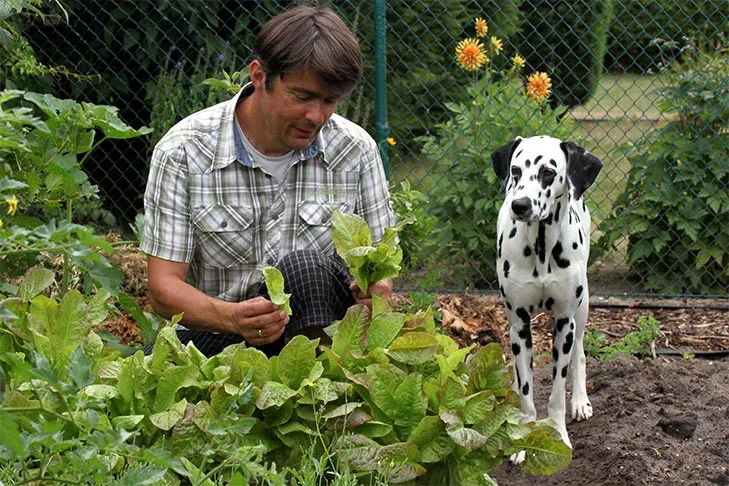 A curious Dalmatian observing a gardener, emphasizing the need to monitor dogs around garden vegetables and potential toxic plants.
A curious Dalmatian observing a gardener, emphasizing the need to monitor dogs around garden vegetables and potential toxic plants.
Fruits Dogs Should Never Eat
While our primary focus is on what vegetables should a dog not eat, it’s equally important to be aware of fruits that pose serious health risks to dogs. Many fruits that are delicious and nutritious for humans can be toxic or harmful to our canine friends due to specific compounds or physical hazards. For a more comprehensive list of fruits unsafe for dogs, refer to a dedicated resource.
Grapes and Raisins
Grapes and raisins are arguably one of the most dangerous human foods for dogs. They are highly toxic to dogs, regardless of breed, sex, or age, and can cause acute sudden kidney failure. The exact toxic substance is still unknown, but even a small amount can be life-threatening.
Symptoms of grape or raisin toxicity can include vomiting, diarrhea, lethargy, dehydration, abdominal pain, and reduced urine production. If you suspect your dog has eaten any amount of grapes or raisins, call your veterinarian or an emergency pet poison control center immediately. Time is critical in these situations. Always ensure these fruits are kept out of your dog’s reach and that any discarded grapes or raisins are secured in a dog-proof trash bin.
Avocado
Avocado, a healthy snack for humans, should not be given to dogs. The pit, skin, and leaves of avocados contain a fungicidal toxin called persin. While the fleshy inside of the avocado fruit contains less persin, it can still be enough to cause gastrointestinal upset (vomiting and diarrhea) in some dogs.
Beyond the persin, avocado flesh is also very high in fat. High-fat foods can lead to pancreatitis in dogs, a painful and potentially serious inflammation of the pancreas. The large pit also poses a significant choking hazard and can cause an intestinal obstruction if swallowed. While some dog treats include avocado oil for skin and coat benefits, feeding the whole fruit is not recommended.
Cherries
With the exception of the fleshy fruit around the seed, most parts of cherry plants contain cyanide and are toxic to dogs. Cyanide disrupts cellular oxygen transport, meaning your dog’s blood cells cannot adequately deliver oxygen throughout the body. Symptoms of cyanide poisoning can include dilated pupils, difficulty breathing, bright red gums, and shock, which constitute a veterinary emergency.
The cherry pits themselves contain cyanide and are a choking hazard, in addition to potentially causing intestinal blockages. If you have a cherry tree in your yard, ensure your dog does not have access to fallen fruit. When enjoying cherries, always remove the pits carefully and dispose of them securely in a dog-safe trash receptacle.
Tomato Plants
While the ripened red flesh of a tomato fruit is generally considered safe for dogs in very small, occasional quantities, the green parts of the tomato plant – including the leaves, stems, and unripe green tomatoes – contain a toxic substance called solanine. Ingesting large amounts of solanine can cause gastrointestinal upset, lethargy, weakness, and confusion in dogs.
Though a dog would need to consume a significant amount of the plant material to become seriously ill, it’s generally safer to avoid feeding tomatoes altogether or at least ensure your dog never has access to the plant itself. If your dog enjoys exploring your vegetable garden, take precautions to prevent them from reaching your tomato plants.
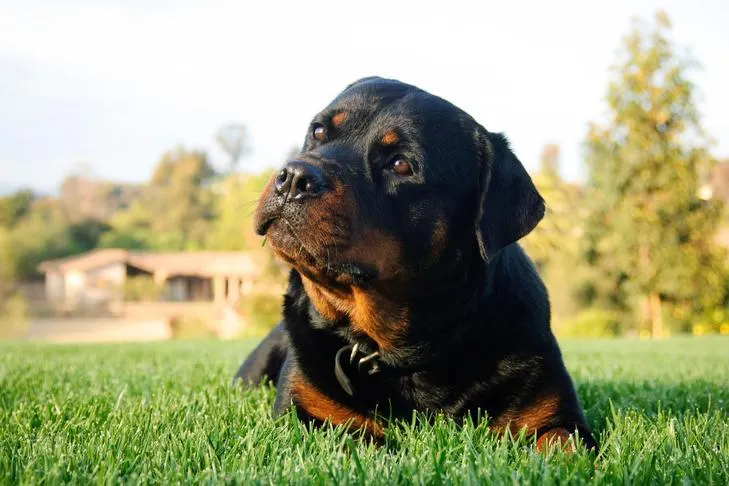 A Rottweiler lying relaxed in a garden, reminding pet owners to keep toxic plants like tomato foliage out of reach.
A Rottweiler lying relaxed in a garden, reminding pet owners to keep toxic plants like tomato foliage out of reach.
Dog-Friendly Fruits for Occasional Treats
Many fruits can be delicious and healthy treats for dogs when given in moderation, providing a source of essential vitamins, minerals, and antioxidants. Remember to always prepare them properly by removing seeds, pits, and rinds.
Apples
Apples are an excellent source of vitamins A and C, as well as fiber. They are low in protein and fat, making them an ideal snack for senior dogs. Always be sure to remove the seeds and core first, as apple seeds contain small amounts of cyanide and the core can be a choking hazard. Try them frozen for a refreshing warm-weather treat.
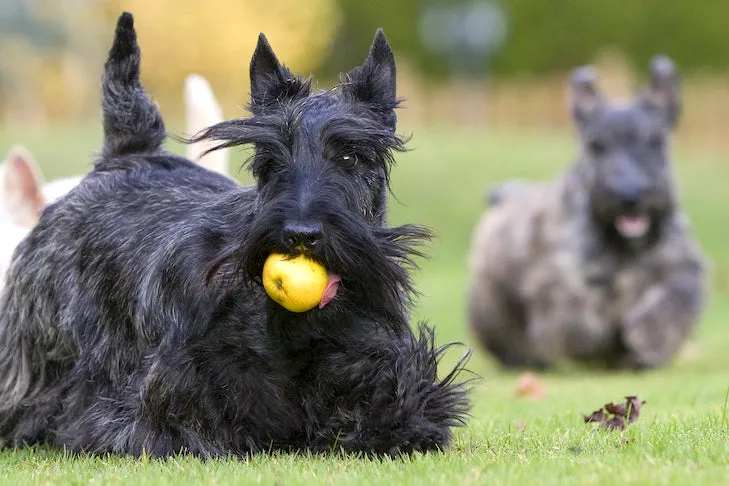 Two Scottish Terriers playing happily in a green field, possibly anticipating a healthy dog-friendly treat like apples.
Two Scottish Terriers playing happily in a green field, possibly anticipating a healthy dog-friendly treat like apples.
Bananas
In moderation, bananas are a great low-calorie treat for dogs. They are high in potassium, vitamins, biotin, fiber, and copper, and low in cholesterol and sodium. However, due to their high sugar content, bananas should be given as an occasional treat, not a regular part of your dog’s main diet.
Blueberries
Often hailed as a superfood, blueberries are rich in antioxidants, which help prevent cell damage in both humans and canines. They are also packed with fiber and phytochemicals. Blueberries are a great size for training treats or for teaching your dog to catch treats in the air.
Cantaloupe
Cantaloupe is packed with nutrients, low in calories, and an excellent source of water and fiber. Its high water content makes it a hydrating snack, especially during hot weather. However, it is also high in sugar, so it should be shared in moderation, particularly for dogs who are overweight or have diabetes. Freezing small cubes of cantaloupe can create a refreshing enrichment snack.
Cranberries
Both fresh and dried cranberries are safe to feed to dogs in small quantities. Their tart taste might not appeal to all dogs, but for those who enjoy them, they offer antioxidants. Moderation is important, as too many cranberries can lead to an upset stomach. It’s crucial to choose unsweetened cranberries, as many dried cranberries sold for human consumption are heavily sweetened, adding unnecessary sugar to your dog’s diet.
Cucumbers
Cucumbers are especially beneficial for overweight dogs as they contain very few carbohydrates or fats and are primarily water, providing satiating hydration. They are loaded with vitamins K, C, and B1, as well as potassium, copper, magnesium, and biotin. Cool cucumber slices make an excellent hot-weather treat, and you can even freeze them for a fun enrichment snack.
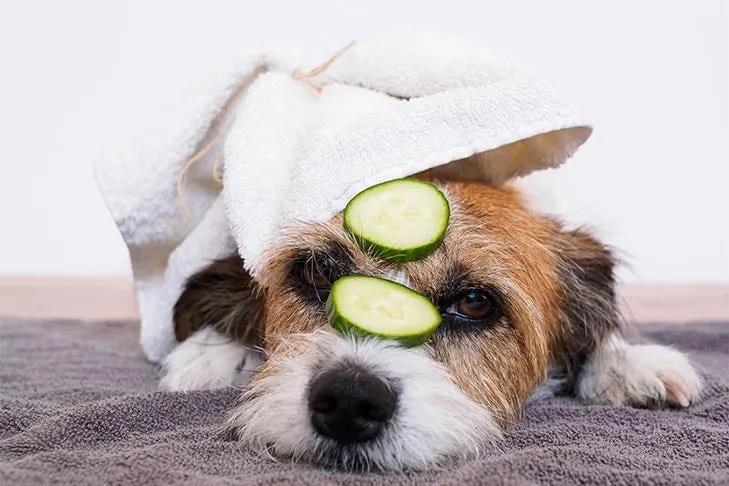 A playful Russell Terrier posing with cucumber slices on its head, highlighting safe and hydrating vegetable treats for dogs.
A playful Russell Terrier posing with cucumber slices on its head, highlighting safe and hydrating vegetable treats for dogs.
Mango
This sweet and juicy tropical fruit is packed with vitamins A, B6, C, and E, as well as potassium, beta-carotene, and alpha-carotene. As with most fruits with a large pit, remember to remove the hard pit first, as it can contain small amounts of cyanide and is a choking hazard. Mango is high in sugar, so offer it as an occasional treat, especially for dogs prone to weight gain.
Oranges
Oranges are generally fine for dogs to eat in small amounts, according to veterinarians. They are an excellent source of vitamin C, potassium, and fiber. However, many dogs are naturally turned off by the strong citrus smells or tastes. If your dog does enjoy them, offer only the juicy flesh, peeled and deseeded. The orange peel is rough on their digestive systems, and the oils can be irritating.
Peaches
Small amounts of cut-up fresh or frozen peaches are a great source of fiber and vitamin A. Similar to cherries, peach pits contain cyanide and should be completely removed and safely discarded. Ensure the flesh is cut away from the pit entirely. Avoid canned peaches, as they typically contain high amounts of sugary syrups, even those labeled “in natural juice.” Frozen peach slices can be a fun summer enrichment snack.
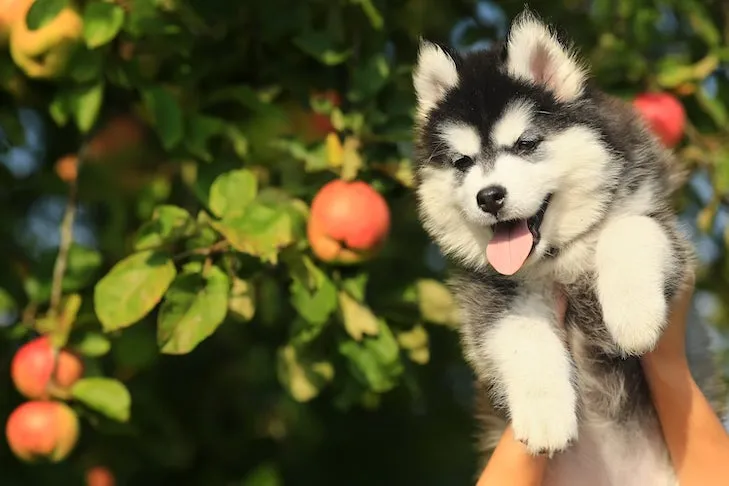 A fluffy Siberian Husky puppy held playfully near an apple tree, symbolizing safe fruit options for dogs when prepared correctly.
A fluffy Siberian Husky puppy held playfully near an apple tree, symbolizing safe fruit options for dogs when prepared correctly.
Pears
Pears are a healthy snack for dogs, being high in copper, vitamins C and K, and fiber. When sharing pears with your dog, always cut the flesh into bite-sized chunks and remove the pit and seeds first, as the seeds contain traces of cyanide. Again, skip canned or jarred pears with sugary syrups.
Pineapple
A few chunks of fresh pineapple can be a great sweet treat for dogs, provided the prickly outside peel and crown are thoroughly removed. This tropical fruit is full of vitamins, minerals, and fiber. It also contains bromelain, an enzyme that can aid in protein absorption. As with other fruits, avoid canned or packaged pineapple in sweetened syrups due to the added sugars.
Raspberries
Raspberries are safe for dogs in moderation. They contain beneficial antioxidants and are low in sugar and calories, but high in fiber, manganese, and vitamin C. Raspberries are particularly good for senior dogs because they possess anti-inflammatory properties that can help support aging joints. It’s important to note that raspberries contain small, naturally occurring amounts of xylitol, a sugar alcohol that is highly toxic to dogs in larger quantities. Therefore, limit your dog to no more than 8 ounces (about a cup) of fresh or frozen raspberries.
Strawberries
Strawberries are full of fiber and vitamin C. They also contain an enzyme that can help whiten your dog’s teeth. Like all fruits, strawberries contain natural sugar, so offer them in moderation. Frozen strawberries can be a fun and cooling enrichment treat for dogs.
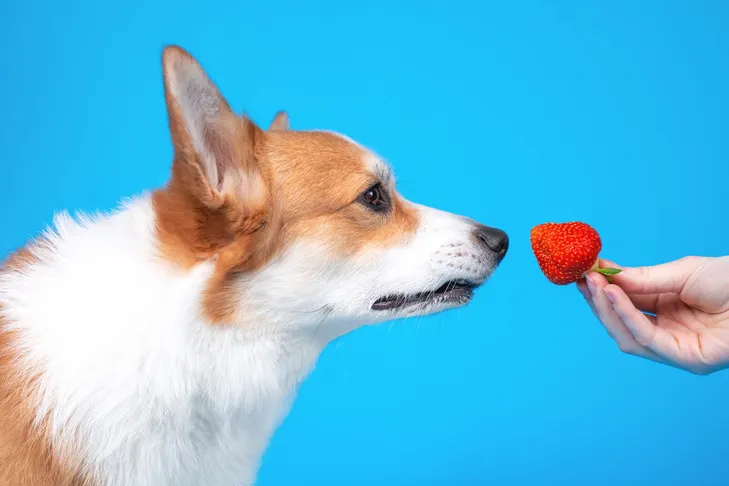 A Pembroke Welsh Corgi curiously sniffing a fresh strawberry, a sweet and safe fruit treat for dogs in moderation.
A Pembroke Welsh Corgi curiously sniffing a fresh strawberry, a sweet and safe fruit treat for dogs in moderation.
Watermelon
Dogs can eat watermelon, but it’s crucial to remove the rind and seeds first, as they can cause intestinal blockage or choking. The flesh of watermelon is safe for dogs and is an excellent source of vitamins A, B-6, and C, as well as potassium. Composed of 92% water, it’s a fantastic way to help keep your dog hydrated on hot summer days. Freeze chunks of seeded watermelon for a refreshing hot-weather treat.
Conclusion
Understanding what vegetables should a dog not eat, along with other dangerous fruits and safe alternatives, is a cornerstone of responsible pet ownership. While sharing human food can be a delightful way to bond with your dog, it’s essential to prioritize their health and safety. Always remember that dogs’ digestive systems differ from ours, and certain compounds harmless to humans can be toxic to canines.
Always introduce new foods slowly and in small quantities to monitor for any adverse reactions. If you are ever unsure about the safety of a particular food, or if your dog accidentally ingests a potentially toxic item, consult your veterinarian immediately. Their expertise is invaluable in ensuring your dog receives the best possible care. By being informed and vigilant, you can provide your furry family member with safe, healthy, and enjoyable treats that contribute to their overall well-being. For further reading and to understand the full spectrum of safe and unsafe human foods for dogs, explore our other articles. Remember, dangerous foods for puppies can also pose a significant threat.
